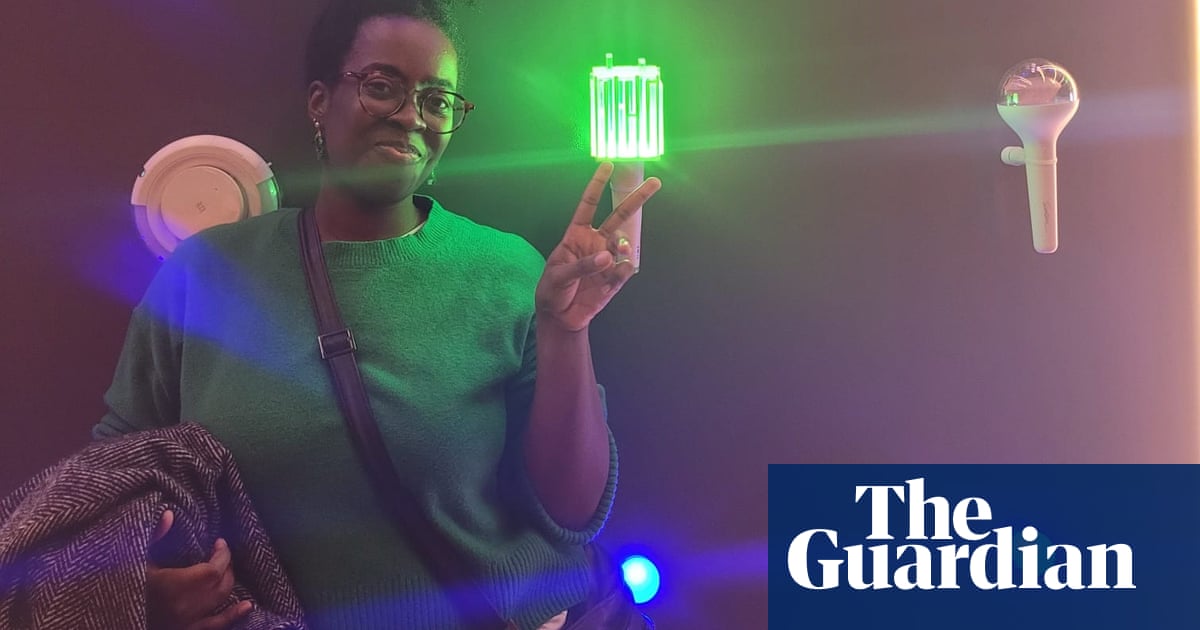‘You need to listen to this,” said my friend Helen over her birthday lunch in 2018. “Have you ever heard ofK-pop?” I hadn’t – I didn’t know it was short for Korean pop music, or about K-pop “idols” (stars). She played me songs by the South Korean boyband SHINee and I was instantly captivated. It reminded me of the pop music I loved in the 00s, when I was growing up: the bombastic music videos, the repetitive electro-pop hooks, the bands where each member has a distinct role, like a family. It was pure escapism.
Gradually, I started listening to more and more K-pop, until I took the plunge and did something I’d previously dismissed as “cringe”. With my twin sister, Hannah, I went to a K-pop-themed “cafe event” at the Gaza cafe in Soho, London. The get-together marked the birthdays of three members of the boyband GOT7. Their music videos played on TV screens and their album sleeves were displayed on the stairwell walls. Mounds of bingsoo – a Korean shaved-ice dessert – were served.
I was surprised to find that the cafe event drew a relatively mixed crowd – including other Black girls, like me. I’d expected to stick out and felt apprehensive that I might leave feeling ostracised from a scene I’d come to adore. But everyone was friendly and welcoming, and we quickly bonded over our shared – albeit niche – interest. Growing up, I was often preoccupied by what other people thought of me; here, no one seemed to care.
As a teenager, I often felt I stood out, despite my best efforts to blend in. By the time I reached my 20s, I was an overweight, dark-skinned “four-eyes”, and acutely aware of it. As a result, I did everything I could to make myself seem smaller: I wore dark clothes, pinned every strand of my afro hair flat to my head and hardly spoke at work. Yet at the K-pop party, Black girls wore bright makeup, band T-shirts and big smiles as they shared homemade photocards (trading cards, a little like football stickers), swapped badges and squealed when their favourite tracks were played.
From there, my K-pop obsession began to snowball. I started listening to boybands such as MONSTA X, BTS and EXO, then girl groups such as Mamamoo and Dreamcatcher. Helen and I, friends since secondary school, launched a K-pop podcast called UK-pop (get it?). The fashion rubbed off on me too: black clothes stopped dominating my wardrobe as I added a red mohair scarf here, a Lucozade-orange balaclava there; I even bought a bomber jacket with pink flamingos all over it. I got silver braids in my hair and wore all my ear piercings at once – something I’d previously avoided, in case it looked “too much”. I spent more than £400 on concerts, including a £160 ticket to see GOT7 at Wembley Arena which included “hi-touch”, where you high-five the group on the way out of the venue (I can distinctly remember my cologne-scented palm afterwards).
Being a K-pop fan bled into my then job as a journalist; I interviewed idols and reviewed concerts. Other Black women who were into K-pop contacted me on social media, including Tasha and Shari, who became good friends offline. With my sister and Helen, we all began meeting up regularly to discuss the latest K-pop news, gigs we’d been to and idol scandals. We went for food at Korean barbecue restaurants, and went to K-pop exhibitions, films and festivals.
I had finally found my tribe, a group of friends I could message day or night about anything – not just K-pop – and feel completely supported. In the decade since I first encountered K-pop culture, we’ve remained a tight-knit group, encouraging each other through new jobs, moving houses, family bereavements and many other big life decisions. We plan to visit Seoul together in the next couple of years – my last visit was in 2019, where my sister and I spent an afternoon going to see the headquarters of K-pop labels including SM Entertainment and JYP.
Although my K-pop obsession isn’t as intense as it was, an ATEEZ concert in January reminded me of why I fell in love with it so hard. Yes, I enjoy the music, but it’s also down to the warm, funny people K-pop has brought into my orbit, close friends who have encouraged me to let my guard down.
I’m now in my 30s and I still aspire to be more like the carefree girls in bright makeup I met at the Gaza cafe all those years ago. I’ve learned that people are not nearly as judgmental as I once feared – and if they are, so what? As K-pop megastars BTS would say: you can’t stop me loving myself.
